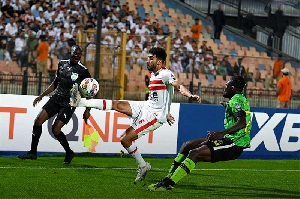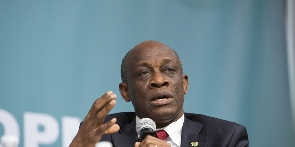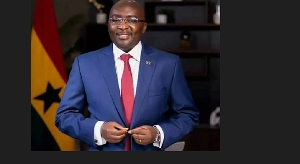- Home - News
- TWI News | TV
- Polls
- Year In Review
- News Archive
- Crime & Punishment
- Politics
- Regional
- Editorial
- Health
- Ghanaians Abroad
- Tabloid
- Africa
- Religion
- Election 2020
- Coronavirus
- News Videos | TV
- Photo Archives
- News Headlines
- Press Release
Business News of Wednesday, 17 September 2014
Source: Dailypost
Forbes Commends President Mahama
On Economic Direction Taken
Respected American Magazine of international repute, Forbes, which features original articles on finance, industry, investing and marketing topics as well as on related subjects such as technology, communications, science and law and is well known for its listings and rankings has in its latest edition lauded President John Mahama for embarking on a path that will ultimately lead Ghana to economic prosperity. In spite of the challenges that the government has faced since it came to power in 2013, the Forbes magazine states that “The Mahama government is not simply moving the goalposts to ensure that its figures reflect reality, but has declared its commitment to bringing about significant, lasting change across the country economy. The goal is to ensure that Ghana enjoys sustainable prosperity in the long term…” Below is the article headed GHANA: THE NEXT STEPS Ghana has the rock-solid social, institutional and economic fundamentals the rest of West Africa strives to emulate: more than 20 years of democratic governance; strong rule of law; competitive industries; an entrepreneurial, investor-friendly business climate; and some of Africa’s most progressive social policies, which have enabled numerous women to rise to the top in political and corporate circles. When we last reported on Ghana in 2012 its economy was riding high, fueled by the nation’s first full year as an oil producer. It posted the world’s highest GDP growth in 2011, with 14.6% and attracted to record $7billion in foreign direct investment (FDI). Two years later, growth is forecast at a very respectable 6.6% for 2014, and FDI inflows were just shy of $4billion last year. But the country faces challenges, and must look for ways to keep the economy on the right path. Since winning the 2012 elections, President John Dramani Mahama’s administration has struggled to sustain growth. Over the last 18 months, commodities Ghana produces in abundance, such as cocoa and gold, have suffered from falling global market prices; blackouts continue to leave locals in the dark and discourage power-hungry investors; and the national currency, the cedi, has lost around 25% of its value against the dollar. Meeting revenue-collection targets remains a challenge for the Ghana Revenue Authority (GRA), despite significant improvements that won plaudits from World Bank in its “Doing Business” report. In 2014, Ghana jumped 26 places in that report’s global ranking, from 94 to 68, based on tax payments. Meanwhile, the removal of state subsidies on petroleum products has forced up fuel prices at the pump, and the planned implementation of value-added taxes on financial services has raised the specter of a slowdown in the booming finance sector. As a result, the GDP growth forecast for 2014 was adjusted down from 8% in July. Meanwhile, a half-year budget revision presented by Minister for Finance and Economic Planning, Seth Terkper, raise the budget deficit target a notch or two from 8.5% to 8.8%, and nudged the annual inflation goal up from 9.5% to 13%, to compensate for the recent fluctuations in Ghana’s fortunes. The Mahama government is not simply moving the goalposts to ensure that its figures reflect reality, but has declared its committee to bringing about significant, lasting change across the country’s economy. The goal is to ensure that Ghana enjoys sustainable prosperity in the long term, even if that means tightening belt for the next few quarters. The title of Minister Terkper’s midyear economic policy review, “Rising to the Challenge: Realigning the Budget to Meet Key National Priorities,” is a call to arms to protect the national economy from external risks, stimulate faster rates of growth and development, create employment and raise living standards for the country’s 25 million people. Rather than relying primarily on the fruits of homegrown productivity and the country’s relatively small internal market-place, Ghana aims to leverage its decades of domestic experience and expertise as one of the region’s most mature, well-developed economies. The county is looking to export its know-how and services to its neighbors in the Economic Community of West African States (ECOWAS) and to expand its economic horizons and consolidate human development gains. “The theme of our transition as a middle-income nation is value addition, diversification and local content,” explains Minister Terkper. “We have to play on our size, while taking advantage of the markets the region provides. If you take into account Ghana, Sierra Leone and Cote d’Ivoire, together with Nigeria, then you have enough economic activity to further enhance regional integration.” This July, the government launched a national export strategy to double Ghanaian exports and reach $5billion by the end of next year. An advisory council of former ministers, as well as representatives from the Ghana Investment Promotion Centre (GIPC) and other entities, are supporting this drive to ensure that the public and private sectors work together to maximize their potential. In recent remarks, the GIPC’s CEO, Mawuena Trabarh, noted: “We have been looking for investments that translate into development. From our perspective, it is important that investors, whether international or domestic, have opportunities, but at the same time recognize that we have an agenda to develop and grow. Investments that translate into job opportunities, technology transfer and economic activity are what we look for in supporting initiatives in the country.” Catalyst for Economic Growth Ghana’s negative economic indicators may have dominated the headlines lately as the cedi continues to slide against the dollar and inflation remains on the rise; however, its financial sector is experiencing a boom, largely overlooked amid all the concerns about the economy. Banking system assets grew by over 44% year-on-year to May 2014, reaching $12.8billion from $9.6billion 12 months previously. Advances, which accounted for 45% of total, drove that growth, and deposits, which shot up 32% in a year, funded it. For its part, the Ghana Stock Exchange led the pack in Africa last year and is now launching a second exchange, specifically aimed at small-and medium-size enterprises (SMEs). This July, the Monetary Policy Committee bumped up baseline interest rates to 19%, the highest since 2004, reinforcing its decision to counter the negative outlook on public spending. Interest rates, however, are not deterring lending to the private sector. The Real Composite Index of Economic Activity climbed nearly 10% year-on-year in the first quarter of 2014. Private sector credit rose 47% in May, compared to 31% the previous year, reaching $5.6 billion, while annual loan growth to private-sector clients stood at 28.2%, in comparison with 18.4% in 2013. The number of nonperforming loans was down, and the capital adequacy ratio remained well above the 10% limit, at 16.7%. According to the Bank of Ghana, this indicates a “banking sector that remains sound and continues to expand,” although concerns linger. A survey of credit conditions this June indicated that availability of credit for consumer loans, SMEs and bigger businesses, as well as short-term loans, could tighten over the year. But the greatest potential for Ghana’s robust, rapidly expanding financial sector lies in the population it does not yet reach. Experts estimate that 70% of its 25 million people are unbanked, giving Ghana’s 27 banks, 137 rural and community banks, 24 savings and loan institutions and financial service providers plenty of room to grow.










